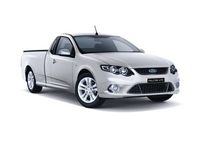Ford: Falcon Ute Achieves 5-Star ANCAP Safety Rating
Ford's FG Falcon Utility has been awarded the maximum five-star safety rating by the Australasian New Car Assessment Program (ANCAP) in the latest round of testing.
SYDNEY – June 16, 2010: The five-star ANCAP safety rating applies to all FG Falcon Ute models fitted with head and chest-protecting side airbags, Dynamic Stability Control (DSC) and a floor-mounted transmission lever – side airbags and DSC are both standard equipment on XR6 and XR6 Turbo models, and available as options on XL and R6 models.The FG Falcon Ute received a total score of 33.58 points (out of a possible 37 points), giving it the highest score ever recorded by a utility in Australia, as well as the second highest score ever achieved by a locally-produced vehicle, behind the FG Falcon sedan.
The result positions the FG Falcon at the forefront of vehicle safety in Australia, with both sedan and utility versions generating higher ANCAP safety point scores than any other vehicle currently produced in this country.
"The FG Falcon has been judged by ANCAP to be the safety leader amongst locally manufactured vehicles, which further reinforces Ford's long standing reputation for safety leadership in Australia," said Ford Australia President & CEO Marin Burela.
"We design our cars to deliver real-world safety benefits for our customers, but this result serves as a resounding third party endorsement of the world-class body structure and comprehensive suite of active and passive safety features we have developed for Falcon.
"The FG Falcon is the safest vehicle ever developed by Ford in Australia and this safety leadership has been recognised by ANCAP."
The Falcon Ute scored 14.62 out of 16 in the frontal offset crash test, with ANCAP reporting that the passenger compartment "was in excellent shape after the test", while a score of 15.96 out of 16 was recorded for the side impact crash test.
This latest safety test result is further validation of the strength of Ford's continual design and engineering improvement process, which has also seen the Territory range awarded a five-star ANCAP safety rating earlier in the year.
Ford's entire locally manufactured vehicle range is now either five-star rated by ANCAP or five-star capable.
The addition of a side head/thorax airbags as standard equipment on the
latest Falcon XR6 and XR6 Turbo Ute models further bolsters the already
extensive list of safety equipment on these vehicles, which
includes:
The FG Falcon Ute is fitted with Ford's Intelligent Safety System – a combination of the latest generation safety devices and electronic management tools that combine state-of-the-art restraint systems with intelligent monitoring of crash severity and occupant positioning.
No other Australia-built vehicle incorporates advanced crash sensors such as those fitted on the FG Falcon. Highly technical door pressure sensors and dual upfront sensors provide early detection of potential crash incidents.
The sensors literally hear the event occurring through pressure waves, before the panels even start to deform, making detection of crash situations instantaneous.
However, importantly, they also provide enhanced discrimination between different types of events to determine the level of response required. Appropriate safety responses for each individual situation are then activated according to incident severity, positioning of occupants and seat belt usage.
With most crash events occurring in less than 100 milliseconds, the ability to rapidly differentiate between types of events is extremely important.
In order to ensure appropriate response levels, 'abuse' testing has been conducted on the vehicle to calibrate the sensors not to activate the airbags and other safety measures in the case of non-crash related incidents such as shopping trolleys running into the doors.



